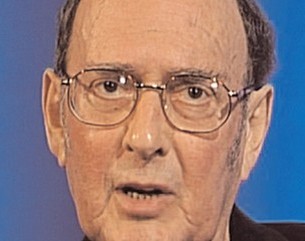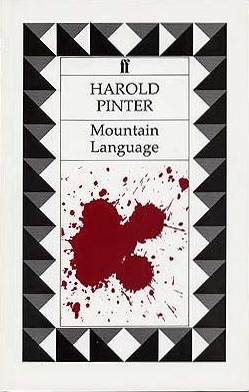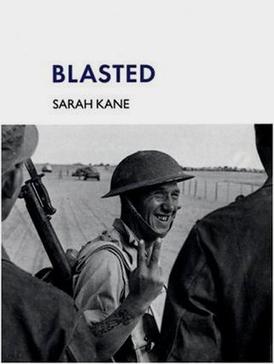
The theatre of the absurd is a post–World War II designation for particular plays of absurdist fiction written by a number of primarily European playwrights in the late 1950s. It is also a term for the style of theatre the plays represent. The plays focus largely on ideas of existentialism and express what happens when human existence lacks meaning or purpose and communication breaks down. The structure of the plays is typically a round shape, with the finishing point the same as the starting point. Logical construction and argument give way to irrational and illogical speech and to the ultimate conclusion—silence.

Harold Pinter was a British playwright, screenwriter, director and actor. A Nobel Prize winner, Pinter was one of the most influential modern British dramatists with a writing career that spanned more than 50 years. His best-known plays include The Birthday Party (1957), The Homecoming (1964) and Betrayal (1978), each of which he adapted for the screen. His screenplay adaptations of others' works include The Servant (1963), The Go-Between (1971), The French Lieutenant's Woman (1981), The Trial (1993) and Sleuth (2007). He also directed or acted in radio, stage, television and film productions of his own and others' works.

Sarah Kane was an English playwright, screenwriter and theatre director. She is known for her plays that deal with themes of redemptive love, sexual desire, pain, torture—both physical and psychological—and death. They are characterised by a poetic intensity, pared-down language, exploration of theatrical form and, in her earlier work, the use of extreme and violent stage action.

Mountain Language is a one-act play written by Harold Pinter, first published in The Times Literary Supplement (TLS) on 7–13 October 1988. It was first performed at the Royal National Theatre in London on 20 October 1988 with Michael Gambon and Miranda Richardson. Subsequently, it was published by Faber and Faber (UK) and Grove Press (USA). Mountain Language lasts about 25 minutes in production. It was most recently performed as part of Theatre of Menace (2016) at the Smock Alley Theatre in Dublin, starring Alisa Belonogina, Paul Carmichael, Lana O'Kell, Jaime Peacock, Louis Tappenden and Natasha Ryan
No Man's Land is a play by Harold Pinter written in 1974 and first produced and published in 1975. Its original production was at the Old Vic theatre in London by the National Theatre on 23 April 1975, and it later transferred to Wyndham's Theatre, July 1975 – January 1976, the Lyttelton Theatre April–May 1976, and New York's Longacre Theatre from October–December 1976. It returned to the Lyttelton from January – February 1977. It is a two-act play.

Blasted is the first play by the British author Sarah Kane. It was first performed in 1995 at the Royal Court Theatre Upstairs in London.

The Birthday Party (1957) is the first full-length play by Harold Pinter, first published in London by Encore Publishing in 1959. It is one of his best-known and most frequently performed plays.

Betrayal is a play written by Harold Pinter in 1978. Critically regarded as one of the English playwright's major dramatic works, it features his characteristically economical dialogue, characters' hidden emotions and veiled motivations, and their self-absorbed competitive one-upmanship, face-saving, dishonesty, and (self-)deceptions.

The Homecoming is a two-act play written in 1964 and published in 1965 by Harold Pinter. Its premières in London (1965) and New York (1967) were both directed by Sir Peter Hall. The original Broadway production won the 1967 Tony Award for Best Play. Its 40th-anniversary Broadway production at the Cort Theatre was nominated for a 2008 Tony Award for "Best Revival of a Play".
Applicant is a dramatic sketch written by Harold Pinter. Originally written in 1959 and first published by Eyre Methuen in 1961, it was first broadcast on BBC Radio on the Third Programme "between February and March 1964," along with Pinter's other revue sketches, That's Your Trouble, That's All, Interview, and Dialogue for Three.
The Hothouse (1958/1980) is a full-length tragicomedy written by Harold Pinter in the winter of 1958 between The Birthday Party (1957) and The Caretaker (1959). After writing The Hothouse in the winter of 1958 and following the initial commercial failure of The Birthday Party, Pinter put the play aside; in 1979 he re-read it and directed its first production, at Hampstead Theatre, where it opened on 24 April 1980, transferring to the Ambassadors Theatre on 25 June 1980, and it was first published, also in 1980, by Eyre Methuen. The play received its American premiere at the Trinity Repertory Company in 1982. Pinter himself played Roote in a subsequent production staged at the Minerva Theatre, in Chichester, in 1995, later transferring to the Comedy Theatre, in London.
Victoria Station is a short play for two actors by the English playwright Harold Pinter.
Night is a dramatic sketch by the English playwright Harold Pinter, presented as one of eight short dramatic works about marriage in the program Mixed Doubles: An Entertainment on Marriage at the Comedy Theatre, London, on 9 April 1969; directed by Alexander Doré, this production included Nigel Stock as the Man and Pinter's first wife, Vivien Merchant, as the Woman (54). It replaced another sketch performed previously in the program We Who Are About To... at the Hampstead Theatre Club on 6 February 1969; each of the original eight sketches about marriage also featured two characters.

Landscape is a one-act play by Harold Pinter that was first broadcast on radio in 1968 and first performed on stage in 1969. The play shows the difficulties of communication between two people in a marriage. This is illustrated through the two characters who appear to be talking to one another though neither seems to hear the other. The dialogue resembles two independent monologues. The play is often studied, read, and performed alongside Silence, another one-act play published soon after Landscape. Both plays mark a change in Pinter's style, with echoes of the work of Samuel Beckett. In both plays nothing happens, the action of the plays is brought to a halt putting an added emphasis on the role of the dialogues and monologues that take place. As one critic put it "nothing happens but much is explored".
Bibliography for Harold Pinter is a list of selected published primary works, productions, secondary sources, and other resources related to English playwright Harold Pinter (1930–2008), the 2005 Nobel Laureate in Literature, who was also a screenwriter, actor, director, poet, author, and political activist. It lists works by and works about him, and it serves as the Bibliography for the main article on Harold Pinter and for several articles relating to him and his works.
Remembrance of Things Past is the 2000 collaborative stage adaptation by Harold Pinter and director Di Trevis of Harold Pinter's as-yet unproduced The Proust Screenplay (1977), a screen adaptation of À la recherche du temps perdu, the 1913–1927 seven-volume novel by Marcel Proust.

The Vortex is a play in three acts by the English writer and actor Noël Coward. The play depicts the sexual vanity of a rich, ageing beauty, her troubled relationship with her adult son, and drug abuse in British society circles after the First World War. The son's cocaine habit is seen by many critics as a metaphor for homosexuality, then taboo in Britain. Despite, or because of, its scandalous content for the time, the play was Coward's first great commercial success.
The Basement is a television play by Harold Pinter. It was written first as a screenplay for a film, then revised for television and broadcast on 20 February 1967.
Christie in Love is an early play by Howard Brenton concerning the life of serial killer John Christie, who murdered at least seven women between 1943 and 1953, after which he was caught, tried and hanged.
Thomas Baptiste was a Guyanese-born British actor and opera singer.
Note regarding quotes from the 1986 Grove edition: as Pinter uses three spaced periods for pauses in his dialogue, editorial ellipses of three unspaced periods are herein placed within brackets.









